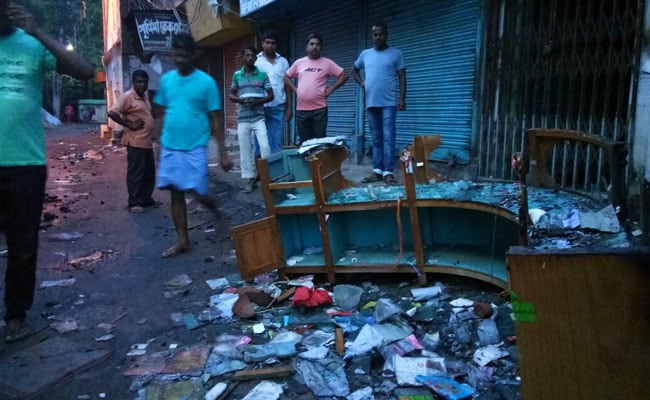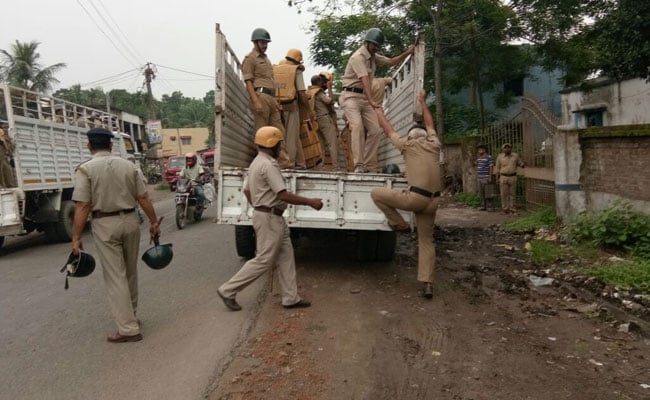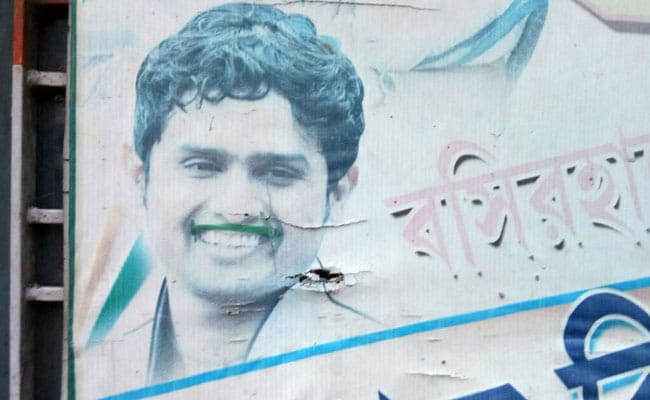Inside the police station, a surprise. Two parliamentarians of the Trinamool Congress confabulating with the police. Idris Ali, the MP from Bashirhat, and the Rajya Sabha MP Hasan Ahmed Imram.
Along with a Hindu maharaj or cleric, they were on their way to Baduria to talk peace when they had run into a roadblock by Muslim youth at Berachampa, about 10 km up from Deganga.
Right then and there, they took turns to climb on a bench, address the crowd and call for peace.
The youth were clapping till Madhu Maharaj, we were told, suffered a slip of the tongue. "Don't get so agitated about a small matter," he said. The mob erupted. Blasphemy a "small matter"? Angry youth lunged at the cleric, almost beat him up, and the parliamentarians had to flee with him.
Stones smashed Mr Ali's car windscreen as they raced off. The cleric was hidden in some house, the car in some garage, lest agitated mobs launch a hunt for the offender. The MPs fled to the police station where we ran into them.
If Trinamool MPs couldn't cross Berachampa, could we? Oh yes, the MPs said.

At least one person was killed and several were injured in the Basirhat riots in West Bengal.
Our local contact, a Muslim reporter, went up to road blockaders at Berachampa, spoke to them, got "permission" for us to film the road block they had put up, record their point of view then cross over to go to Baduria. But the moment the camera rolled, one young man rushed in shouting; he pushed the camera away and the cameraperson back.
Physically.
I objected. They shouted me down.
All the while, two jeeps full of police just stood and watched.
As we drove back to Deganga, phone calls from Bashirhat. Clashes had erupted in that town, some 20 km from Baduria.
And we could not get to either of these towns. Internet shut down. Only phone calls. News from Baduria grim. Trouble, since Saturday. Muslim youth surrounded the Hindu boy's house. Police called religious leaders to pacify them. Late at night, the boy was arrested from his hiding place.
Sunday, Baduria simmered. Monday erupted. Police station gheraoed, police vehicles burnt, inside the compound and outside. Police pushed back the crowd, once, twice, several times to finally disperse them late night. Tuesday, mobs put up road blocks, on the road to Bashirhat too.
As we tried to figure out how to get past the road blocks, in Kolkata, Mamata Banerjee took on the Governor.

Police enforced restrictions on large gatherings in Bashirhat in West Bengal.
"Someone or some organization other than the boy seems behind the whole thing," said MP Imran. "And they strategically chose a minor for the job, knowing he will come under juvenile laws and get away lightly, relatively speaking."
The answer remains unanswered till now. Police are probing several outfits. Two have been blacklisted -- Hindu Samhati and MIM or Majlis e Ittehad Musalmeen which has fairly recently set up shop in Bengal.
The next day, July 5, Deganga police station was flooded with police and BSF. A man in an auto rickshaw, megaphones tied to its roof, blared, "Section 144 is imposed. Please don't congregate. Please stay home."
We drove past a convoy of security vehicles as it headed in the direction of Bashirhat, stopped at a place that had a name written clearly on a green board: "Matia". The OB van drew a crowd. Muslim youth. One of them took me to Sheikh Matin, a community leader of considerable local standing. He lamented the clashes, tension and the administrative failure. "The police should have acted, central forces should have been deployed earlier, then all this trouble wouldn't have happened," he said.
Next stop, Harishpur. Just short of Bashirhat. A security convoy parked on my right as policemen dragged off a huge tree, leaves still fresh green, chopped down and put across the road by unknowns.

Lawmaker Dipyendu Biswas's visit to a Muslim majority area resulted in an outburst by ordinary Hindus.
Road cleared, police stop a motorcyclist coming from Bashirhat. He has a sack of rice. Thief, the police say, and marched him off. Up ahead, two rice-laden trucks had been attacked, their drivers fled and people were looting, we were told and we saw later. A cop drove off with the seized motorcycle and bag of rice.
Free rations?
Men and women peeped out of homes, first in ones and twos, then in scores. A 'para' club by the road ransacked, a TV smashed, windows of homes lining the road, shattered, Hindu women and men say just an hour or so ago, Muslim mobs rampaged.
"Last night was frightening," said a mother. "They came in small trucks. I hid my children under the bed. They are still shivering in fear."
Not just scared, the Hindus were angry. "Police, BSF are simply driving up and down the road. What's the use," they chorus.
Finally, Bashirhat, 100 km from Kolkata. At College More, burnt remains of a motorcycle in the middle of the road. Not a soul in sight. Who did it? When? A man peeps down from a roof. "It was burnt an hour ago," he whispers. Who by? I ask. "We Hindus," he says. "The Muslim driver ran away. But our backs are to the wall. We have to hit back."
Hit back for burnt shops, ransacked shops, fear.
Drive to Falguni Cinema Hall More to charred shops. Even a bank and an ATM blackened. Hindu shops, we are told. In narrow side lanes, large pieces of furniture dragged out of a cell phone shop, phones scattered on the ground, kiosks topsy turvy.
And glass. Green shards carpet the street. Sprite bottles may be, hurled at each other by rival communities. Monday night and Tuesday, they battled each other. At Bhabla, Moylakhola, Paikpara.
Ditto Trimohini. At the T-junction, some metal police barriers. Tied to one, a bamboo pole listing at 45 degrees. Fluttering down from it, a peace of white cloth. A white flag for peace. A couple of police sit around. Behind them, Nikaripara. Don't go, they tell us, the road is cut.
Milling some 100 odd yards away, young Muslim men. Watchful. A senior citizen comes up and says all is well. A motorcycle drives up, two children sandwiched between the parents. Hindus. A big bag hangs on one side. I ask, are you leaving town? No, no, we are going to a wedding nearby. The Muslim senior says, everything is ok, isn't it? Yes, yes, the Hindu couple says. And flee.
8 pm, I am back at Falguni More, waiting for a live OB for the news at 9 pm. 30-40 men throng our car and OB van. Hindus. Angry. We are being labeled BJP by you media people, they shout, but that's false. We are not doing party. They are. They (Muslims -- the word is not used, mostly) can get away with anything and we are labeled "BJP" if we resist?
A teacher who said I could use his name, Ganesh Ghosh, makes the most profound comment of all. "I condemn the post on Facebook. But just because one Hindu boy has shown disrespect to the Prophet, does that mean we Hindus are all showing disrespect to Him? Just because one Muslim terrorist kills 20 people somewhere, do we say all Muslims are terrorists?"
Suddenly, one of the 30-40 men gets a phone call. Oh my God, they are coming again, I am off, he says. Mr Ghosh calls his family, says sorry I have to go too. Some Muslims are apparently trying to enter our area. He cycles off. Another man apologizes for deserting me. "I have to protect my home, don't I?" he says. In a flash, there are only four men left standing by me. I break out in a sweat. My crew, too.
We go live at 9.07pm. Over and done, we want to exit the dark, silent, brooding town.
But my four guardians won't let me go. One of them, elderly, sickly, with a lazy eye, says, I am an RSS worker and make no bones about it. Another says, "We Hindus are now united and will resist Muslims".
The third, a young man in a green T, says, "I was a Trinamool supporter. But if I have to survive in Bashirhat, I think I have to switch."
The 6th of July, news of the first - and only - reported death. Of Kartik Ghosh, a 60-year-old resident of Bashirhat, who had been attacked on 4th July and rushed to a hospital in Kolkata for critical treatment.
We had gone some 40 km towards Bashirhat. News from there was, all calm. No roadblocks. That's when we heard, trouble at RG Kar Hospital in Kolkata where Kartik Ghosh had died.
BJP leader Locket Chatterjee had gone to the hospital, demanded to see the family of the deceased who she claimed was of the party. Trinamool supporters had blocked her way and heckled her. Senior BJP party leaders were on their way to hospital.
To Bashirhat or to RG Kar? RG Kar, we decided. Arriving to see a large police presence and a large Trinamool youth president. Ms Chatterjee had left by then. But soon after, chaos at the hospital gate.
State BJP president Dilip Ghosh and national general secretary Kailash Vijayvargiya arrived and Trinamool protestors pounced on them. BJP supporters joined the melee, engaging almost in a hand to hand fight. Police joined in, trying to pull the rival groups apart. Traffic ground to a standstill. The sirens of ambulances trying to exit or enter the hospital wailed and wailed. In vain. For close to an hour. Finally, police urged the BJP leaders to leave.
Then grim news from Bashirhat started pouring in around 5 pm. The local Trinamool MLA Dipendu Biswas, a professional footballer once, had gone to a Hindu majority area at Moylakhola. The police arrived at the same time. Some locals said police detained a couple of men on their list of suspected troublemakers. Biswas just happened to be there. Others claimed Biswas had pointed out to the police homes of the Hindu youth and ordered police to pick them up.
The truth must lie somewhere out there. But the result of Biswas's visit was an outburst against the Trinamool by ordinary Hindus who came on to the streets, set car tyres on fire and stopped all cars, including media vehicles, and searched them. "Is Dipendu in your car?" media persons were asked. Many asked to get off so a proper search could be conducted. The police lathicharged, more outrage. Bashirhat on the boil.
When I went back on the 7th of July, Friday, I felt the situation was worse that I had ever seen it. Hindu crowds greeted me at College More, insisted I go into a lane where police had been called to arrest four Muslim outsiders allegedly seen entering the area with arms.
Have you seen people with arms, I asked at least a dozen people in the hundred milling around. Only one said yes. Tree trunks lay across the road. People angry. A BSF jeep with a gun turret. Armed jawans. Apparently one youth had been detained with a country made pistol. He was taken away.
Drove back to the white flag at Trimohini. Policemen at the T junction. Beyond it, Muslim men, like before, watching. The police said the same thing they said last time. Don't go. The road is cut ahead. Again, I was daunted. I did not go further.
A young man was standing nearby in a purple T-shirt and a stylish hair-cut. I asked him when school would reopen. He said he had dropped out of school after class 9. His father had died. So what did he do? "I behead shrimps and prawns." His father used to do the same.
Finally, I asked him how the situation was. "It is better but we are worried they will attack again," he said. "Who?" I asked. "The Hindus".
From Saturday, the beginning of a long journey to normalcy.
8 pm Saturday July 15, there was still no net for the common man in Bashirhat though internet links to banks had been restored.
(Monideepa Banerjie is NDTV's Resident Editor based in Kolkata.)
Disclaimer: The opinions expressed within this article are the personal opinions of the author. The facts and opinions appearing in the article do not reflect the views of NDTV and NDTV does not assume any responsibility or liability for the same.


